
Data Science and Engineering
Scope & Guideline
Empowering innovation through data-driven research.
Introduction
Aims and Scopes
- Data Mining and Analysis:
The journal emphasizes research in data mining techniques, including efficient algorithms for extracting insights from large datasets, anomaly detection, and classification methods. - Graph and Network Analysis:
A significant focus is on the application of graph theory and network analysis to various domains, including social networks, recommendation systems, and complex systems modeling. - Machine Learning and Artificial Intelligence:
The journal publishes works that advance machine learning methodologies, including deep learning, reinforcement learning, and their applications in diverse fields such as healthcare, transportation, and finance. - Blockchain and Federated Learning:
Research exploring the integration of blockchain technology with machine learning frameworks, particularly federated learning, is a key area of interest, emphasizing privacy-preserving data processing. - Spatial-Temporal Data Processing:
The journal covers methodologies for analyzing spatial-temporal data, crucial for applications in urban planning, traffic forecasting, and environmental monitoring. - Recommendation Systems:
A core area involves developing novel recommendation algorithms that utilize user behavior and preferences, often leveraging advanced techniques such as graph neural networks and contrastive learning.
Trending and Emerging
- Federated Learning and Privacy-Preserving Techniques:
There is a notable increase in research focused on federated learning and privacy-preserving methods, reflecting growing concerns over data privacy and the need for secure distributed learning frameworks. - Graph Neural Networks and Their Applications:
The rise of graph neural networks in various applications, including social recommendation and anomaly detection, highlights an emerging trend that emphasizes the importance of relational data in modern data science. - Integration of AI with IoT (AIoT):
Papers exploring the intersection of artificial intelligence and the Internet of Things (IoT) are on the rise, particularly in applications like smart cities and infrastructure maintenance, showcasing the relevance of data science in real-time sensing and automation. - Explainable AI (XAI):
The growing emphasis on explainability in AI systems is reflected in increasing publications addressing how to make machine learning models more interpretable and accountable, which is essential for user trust and regulatory compliance. - Multi-modal and Cross-domain Learning:
Research that involves learning from multiple data modalities and across different domains is gaining prominence, indicating a trend towards more holistic approaches to data analysis and model training.
Declining or Waning
- Traditional Statistical Methods:
There seems to be a waning interest in conventional statistical analysis techniques, as the focus shifts towards more advanced machine learning and data mining methods. - Basic Data Structures and Algorithms:
Papers centered on fundamental data structures and algorithms are becoming less frequent, indicating a movement towards more complex applications and hybrid approaches involving multiple methodologies. - Classic Database Management Systems (DBMS):
Research that solely focuses on traditional DBMS without the integration of modern data processing techniques (like big data or NoSQL systems) appears to be declining, as the field moves towards more innovative data architectures.
Similar Journals

Frontiers of Computer Science
Advancing the Boundaries of Computational InnovationFrontiers of Computer Science is a leading peer-reviewed journal dedicated to advancing the field of computer science through the publication of high-quality research articles, reviews, and theoretical discussions. Published by HIGHER EDUCATION PRESS, this journal has gained significant recognition, currently boasting a prestigious impact factor and ranking in the Q1 quartile for both Computer Science (miscellaneous) and Theoretical Computer Science categories in 2023. With a focus on the intersection of computational theory and practical applications, it serves as a vital platform for researchers, professionals, and students alike who are eager to contribute to and stay updated with groundbreaking developments. The journal’s scope encompasses a wide range of topics, reflecting the diverse nature of computer science today. Operating from Beijing, China, it emphasizes Open Access, ensuring that vital research is readily available to the global academic community. With its convergence period spanning from 2013 to 2024, Frontiers of Computer Science remains committed to fostering innovation and scholarly dialogue that drives the future of technology.

JOURNAL OF INTELLIGENT INFORMATION SYSTEMS
Pioneering Research in AI and Information SystemsThe Journal of Intelligent Information Systems, published by Springer since 1992, is a premier academic journal that offers a multidisciplinary platform in the fields of Artificial Intelligence, Computer Networks and Communications, Hardware and Architecture, Information Systems, and Software. With an impressive impact reflected in its 2023 Q2 category rankings across multiple domains and a commendable standing in the Scopus Rankings—ranking #84 in Computer Networks and Communications and #101 in Artificial Intelligence—the journal is recognized for its contribution to advancing knowledge and innovation. Although it is not an open-access journal, its accessibility through institutional subscriptions ensures that a wide range of researchers, professionals, and students can engage with high-quality, peer-reviewed research that addresses the latest advancements and trends in intelligent systems. For over three decades, this journal has effectively bridged gaps between academia and industry, making it a vital resource for those aiming to push boundaries in intelligent information systems.
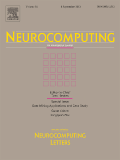
NEUROCOMPUTING
Shaping Tomorrow's AI Through Cognitive UnderstandingNEUROCOMPUTING is a premier academic journal published by ELSEVIER, specializing in the interdisciplinary fields of Artificial Intelligence, Cognitive Neuroscience, and Computer Science Applications. With an impressive impact factor and a Q1 ranking in its relevant categories for 2023, NEUROCOMPUTING is recognized as a leader in fostering innovative research and providing a platform for ground-breaking studies. The journal’s scope covers the convergence of neural computation and artificial intelligence, making it essential reading for researchers and professionals seeking to explore the latest advancements and applications in these dynamic fields. For those interested in the cutting-edge intersection of neuroscience and computational techniques, NEUROCOMPUTING offers a wealth of knowledge that significantly contributes to both theoretical and practical advancements. The journal is dedicated to publishing high-quality, peer-reviewed articles and is an invaluable resource for students and established scholars alike, looking to stay at the forefront of research trends.

Science China-Information Sciences
Connecting Researchers for Transformative Insights.Science China-Information Sciences is a prestigious academic journal published by SCIENCE PRESS, dedicated to advancing knowledge in the field of information sciences and computer science. Established in China, the journal has gained a remarkable reputation, with a 2023 category quartile ranking of Q1 in Computer Science (miscellaneous) and an impressive Scopus rank of #16 out of 232 in General Computer Science, positioning it within the 93rd percentile. The journal embraces a broad spectrum of topics, from theoretical frameworks to practical applications, providing a platform for researchers, professionals, and students to disseminate their findings and engage with the latest advancements in the field. With open access options available, Science China-Information Sciences ensures that innovative research is accessible to a global audience, fostering collaboration and interdisciplinary dialogue. The journal not only reflects the evolving landscape of information sciences but also plays a pivotal role in shaping future research directions.
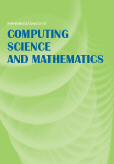
International Journal of Computing Science and Mathematics
Exploring Innovative Solutions in Computing and MathematicsThe International Journal of Computing Science and Mathematics, published by INDERSCIENCE ENTERPRISES LTD, is a pivotal platform for the dissemination of cutting-edge research in the intertwined disciplines of computing science and mathematics. With an ISSN of 1752-5055 and an E-ISSN of 1752-5063, the journal primarily serves the academic community engaged in applied mathematics, computational mathematics, theoretical computer science, and more, making significant contributions that resonate across various fields of technology and science. While the journal is currently categorized in the Q4 quartile for multiple related fields, including Applied Mathematics and Computational Theory, it continues to strive towards advancing the knowledge and practice within these areas. Spanning years from 2007 to 2010 and again from 2012 to 2024, the journal seeks to publish high-quality, peer-reviewed articles that not only address theoretical advancements but also explore practical applications of computing science in mathematical contexts, thereby fostering collaboration among researchers, professionals, and students alike. Please note that this journal is not available as Open Access, thus ensuring a curated content selection intended for dedicated research communities.

KNOWLEDGE AND INFORMATION SYSTEMS
Bridging Theory and Practice in Information SystemsKNOWLEDGE AND INFORMATION SYSTEMS, published by SPRINGER LONDON LTD, is a distinguished journal in the field of information systems, artificial intelligence, and human-computer interaction. With its ISSN 0219-1377 and E-ISSN 0219-3116, this journal has built a robust reputation since its inception, featuring a convergence of valuable research from 2005 through 2024. Catering to a diverse academic audience, it is classified among the leading journals in its category, proudly holding a Q1 ranking in Information Systems and Q2 rankings in multiple other domains. The journal aims to publish cutting-edge research that not only advances theoretical understanding but also provides practical applications within these rapidly evolving fields. Although it is not an Open Access journal, subscribers can access a wealth of knowledge critical for researchers, practitioners, and students looking to enhance their expertise. With a 2023 Scopus rank placing it within the 66th percentile for Information Systems, KNOWLEDGE AND INFORMATION SYSTEMS is an invaluable resource for those committed to pushing the frontiers of knowledge in technology and information science.
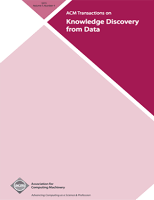
ACM Transactions on Knowledge Discovery from Data
Empowering Researchers with Knowledge Extraction TechniquesACM Transactions on Knowledge Discovery from Data (TKDD), published by the Association for Computing Machinery, is a prestigious journal at the forefront of the interdisciplinary realm of data mining and knowledge discovery. With an impressive Q1 ranking in Computer Science and a Scopus rank of #43 out of 232, this journal stands out as a top-tier resource for innovative research that addresses complex challenges in data science. Covering impactful studies from 2007 to 2024, TKDD presents cutting-edge algorithms, methodologies, and applications that shape the future of knowledge extraction from vast datasets. While not an open-access journal, it provides a platform for researchers, professionals, and students to disseminate their findings and engage with the latest advancements in this rapidly evolving field. By fostering collaboration and knowledge sharing, TKDD plays a vital role in advancing the understanding and application of data analysis techniques, making it an essential read for anyone involved in the pursuit of knowledge from data.
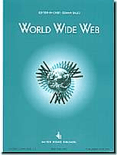
WORLD WIDE WEB-INTERNET AND WEB INFORMATION SYSTEMS
Pioneering Research in Internet TechnologiesWORLD WIDE WEB - INTERNET AND WEB INFORMATION SYSTEMS, published by Springer, is a leading academic journal that focuses on the cutting-edge areas of Internet technologies and web-based information systems. With an esteemed ISSN of 1386-145X and an E-ISSN of 1573-1413, this journal has been a significant contributor to the fields of Computer Networks and Communications, Hardware and Architecture, and Software since its inception in 1998. The journal consistently ranks in the Q1 category across these fields, reflecting its high impact and relevance, evidenced by its impressive Scopus rankings where it stands in the upper percentiles (79th for Computer Networks and Communications, 77th for Hardware and Architecture, and 75th for Software). Researchers, professionals, and students looking to stay at the forefront of web information systems will find a wealth of valuable resources and innovative research compellingly presented in this journal, available for publication until 2024.
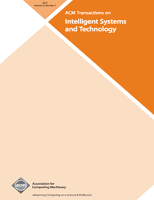
ACM Transactions on Intelligent Systems and Technology
Innovating Tomorrow's AI and Theoretical Computer Science TodayACM Transactions on Intelligent Systems and Technology, published by the Association for Computing Machinery (ACM), is a leading peer-reviewed journal dedicated to the rapid dissemination of innovative research in the fields of Artificial Intelligence and Theoretical Computer Science. With an impressive Impact Factor and a strong H-Index, it boasts a premier standing in the academic community, being ranked Q1 in both AI and Theoretical Computer Science categories as of 2023. This journal serves as a critical platform for researchers, professionals, and students aiming to contribute to and stay informed about the latest developments in intelligent systems and technology. While there are currently no open-access options, readers can explore invaluable insights into current trends and methodologies from 2010 to 2024, making it an essential resource for anyone passionate about advancing their knowledge in these rapidly evolving domains. The journal continues to foster collaboration and innovation, reflecting the forefront of research where technology intersects with intelligent systems.

JOURNAL OF INFORMATION SCIENCE AND ENGINEERING
Exploring New Frontiers in Computational Theory.JOURNAL OF INFORMATION SCIENCE AND ENGINEERING, published by the Institute of Information Science in Taiwan, is a pivotal platform for the dissemination of innovative research in the multidisciplinary fields of information science and engineering. Established in 1993, the journal primarily focuses on areas such as library and information sciences, human-computer interaction, hardware and architecture, as well as computational theory and software development. Despite holding a current Q4 ranking in several categories, the journal demonstrates significant potential for growth, particularly in computation and software systems, as evidenced by its Scopus rankings and percentiles. Researchers, professionals, and students will find this journal to be an invaluable resource to stay abreast of evolving theories and technologies in information science. The journal is accessible through traditional subscription models, fostering a broad academic outreach. It serves to enhance knowledge-sharing and collaboration within this dynamic and ever-evolving field.